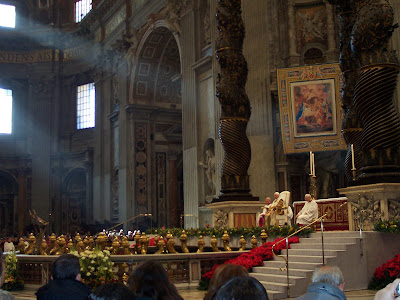Jesus, Judas, and the Poor
Today's readings (Monday after Palm Sunday; Isa 42:1-7; Ps 27; Jn 12:1-11) are powerful ones. The Gospel passage bears repeating before discussion:
"Six days before Passover Jesus came to Bethany, where Lazarus was, whom Jesus had raised from the dead. They gave a dinner for him there, and Martha served, while Lazarus was one of those reclining at table with him. Mary took a liter of costly perfumed oil made from genuine aromatic nard and anointed the feet of Jesus and dried them with her hair; the house was filled with the fragrance of the oil. Then Judas the Iscariot, one of his disciples, and the one who would betray him, said, "Why was this oil not sold for three hundred days’ wages and given to the poor?" He said this not because he cared about the poor but because he was a thief and held the money bag and used to steal the contributions. So Jesus said, “Leave her alone. Let her keep this for the day of my burial. You always have the poor with you, but you do not always have me.” The large crowd of the Jews found out that he was there and came, not only because of him, but also to see Lazarus, whom he had raised from the dead. And the chief priests plotted to kill Lazarus too, because many of the Jews were turning away and believing in Jesus because of him."
A lot of disaffected or disillusioned Catholics cite the splendor of some parish churches, or St. Peter's in Rome, the very exemplar of architectural splendor, as their reason for being unhappy with the Church. They will even make the same recrimination made in today's gospel reading, "Why was this... not sold... and given to the poor?"
It is worth noting, first of all, that this objection was Judas Iscariot's. It was he who betrayed our Lord and they are lying to themselves just as Judas did. Mary of Bethany, out of devotion to our Lord, poured out a year's wages - an enormous sum for anyone - what was almost certainly the bulk of her wealth, perhaps even her dowry and chance at marriage - upon the feet of the One who had saved her. Judas by contrast, devoted not one bit to our Lord but only to himself, was accustomed to taking for himself what had been given to him in trust for service to God.
The gifts that God has invested in us - time, talent, and treasure - we are meant to hold in trust until He comes to reclaim them. More than that, we are called to invest them to great profit in His service. The greatest investment we can make on God's behalf is to give them to those in greatest need, to those for whom He has a special affection - His poor little children. Christian stewarship is the way of life that recognize that what we have been given is not primarily for ourselves, but for those around us. The gifts we have we are given to share, in the words of a popular hymn. When we fail to exercise Christian stewardship, we act as Judas, taking for ourselves what was given to us in trust for service to God.
Judas did not understand what Jesus was about. He understood Jesus as a some sort of political or military leader, and seems to have become increasingly disturbed that Jesus was not doing a very good job of capitalizing on His immense popularity. Many modern Christians also do not understand what Jesus was about. They see him as some sort of figure head, or leader of a movement that has come to "solve" poverty or overturn a wicked economic system.
Judas did not understand that the Kingdom that Jesus had come to establish, a Kingdom that truly is ordained to overturn all the kingdoms of the world, would not be just another kingdom along the same lines - but a whole different sort of thing. Rather than governing by force of arms, it would govern by the suasion of love. Rather than murdering its enemies, it would heal and reconcile them. Rather than being founded upon the blood of its enemies, it would be built on the blood of its Founder. Judas wanted Jesus to seize power, and Jesus wanted only to give His life. Jesus understood something (well, a number of things) that Judas did not: God's inexaustible generosity. The Good News of this new kind of Kingdom isn't that we're going to invent a new politico-economic way of doing things. The Good News is that Jesus Christ is Lord, and that he has power over kings and corruption, and even over death itself.
Mary of Bethany, whose brother Jesus raised from the dead, understood that as well. She poured out her best upon the One who would pour out His best. She gave everything to Him who would give everything, who had been giving everything since the outset of His public ministry. Her gesture of pouring perfume reveals the depth of conversion that Jesus had poured into her heart. Judas, with his objection, did not reveal the generosity of its heart, but its miserliness. People who object along Judas' lines - well, let's say that I for one have never met one that tithed, or probably even gave more than a dollar or two a week at the offertory. Someone who has learned to sacrifice in order to give will have a generous heart and an easy conscience on the matter, and no objection to giving more not only to the poor, but to our Lord and His house of worship as well.
"But," many people say nowadays, "all those fine golden chalices in churches - wouldn't Jesus be happier with humble vestments and such?" This objection represents a misunderstanding of history and culture and the heart, and it is a thin cover for the same ungenerosity. If Jesus, a humble worker, used a ceramic mug for the Passover supper, you can be certain it was because He had nothing better. It would be incomprensible to a 1st century Jew as it was to a Jew 500 years earlier and as it is to a Jew now to use one's second best, let alone one's worst, in the worship of Almighty God. Any Jew would use his very best for the Passover, and like as not would have special equipment just for it. And Jesus, cared for as He was by so many doting widows, likely enough had much finer than baked mud to use for worshiping His Father.
We cushy Americans with our fancy vacations, sports cars, and video games - more wealth amassed in one nation than ever before in the history of the world - can certainly manage better for God than a ceramic mug. The whole point of Jesus living such a simply life was that He was God and gave up everything to be with us. Those of us who have given up very little give even less when we can spare nothing better than a pewter jug for the worship of Almighty God. It is not the same gesture as Mary's, or as Jesus', not at all. Such gestures do not honor and exalt but rather parody God's great humility; they do not show our appreciation for His sacrifice but our lack of gratitude for it. If the best we could do was a simple table, threadbare vestments, and a tin cup - well, that would be more than enough for God. And in places where that is the best that can be done - concentration camps, lands where Christians are persecuted, warzones - God is glad that it is done. But people in those dark places are the ones who most hunger for lavish churches and spledid symbols for God. It is only in our comfortable and selfish generation that we cannot spare a bit of gold for God.
If we will not make our best efforts for God, then we will make ourselves into Judas. For a generous heart there is no contradiction between pouring perfume on Jesus' feet and giving three hundred days' wages to the poor. 























No comments:
Post a Comment